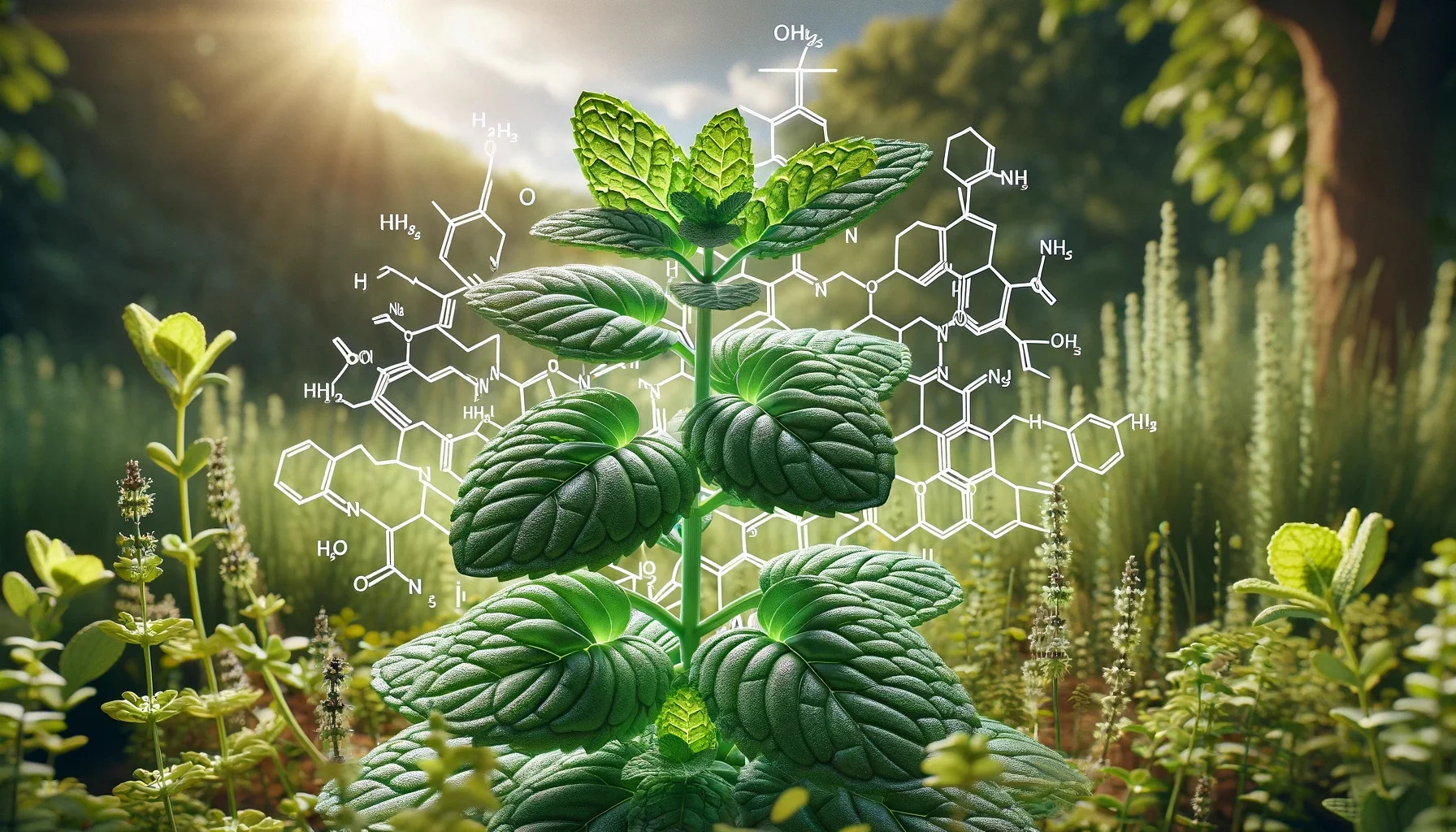
Peppermint (Mentha piperita) is a popular herb known for its refreshing aroma and flavor. It’s also gaining attention as a potential nootropic due to its cognitive-enhancing properties.
Peppermint contains several bioactive compounds, including menthol, menthone, and rosmarinic acid, which may improve memory, focus, and mood.
This article explores the nootropic benefits, uses, dosage, and side effects of peppermint.
Table of Contents
What is a Peppermint?
Peppermint (also known as red gum or mint) is an aromatic herb from within the mint family (Lamiaceae).

It’s a natural hybrid of watermint (Mentha aquatica) and spearmint (Mentha spicata).
Peppermint has been used for centuries in traditional medicine to treat various ailments, including digestive issues, headaches, and colds.
More recently, research has revealed peppermint’s potential as a natural nootropic due to its cognitive-enhancing properties.
What are the Different Types of Peppermint?
There are several cultivars of peppermint, including:
- Black Mitcham: Known for its high menthol content and strong aroma
- White Mitcham: Has a milder flavor and lower menthol content compared to Black Mitcham
- Todd’s Mitcham: A disease-resistant variety with a high essential oil content
- Eau de Cologne: Characterized by its mild, sweet aroma and low menthol content
What are The Bioactive Compounds in Peppermint?
Peppermint contains several bioactive compounds that contribute to its nootropic effects:
Peppermint contains several bioactive compounds, including:
- Menthol (35-45%): The primary constituent responsible for peppermint’s cooling sensation and cognitive effects
- Menthone (10-30%): A monoterpene ketone that contributes to peppermint’s aroma and flavor
- Rosmarinic acid (0.1-0.5%): A polyphenol with antioxidant and anti-inflammatory properties
- 1,8-Cineole (eucalyptol) (3-6%): A monoterpene oxide with cognitive-enhancing effects
- Limonene (1-5%): A monoterpene with anxiolytic and mood-enhancing properties
How Bio-Available is Peppermint?
Peppermint and its bioactive compounds are well-absorbed when consumed orally.
Menthol is rapidly absorbed from the gastrointestinal tract, with peak plasma concentrations occurring within 1-2 hours of ingestion.
The bioavailability of rosmarinic acid is estimated to be around 1.1-1.7%.
What is Peppermint’s Mechanism of Action?
Peppermint exerts its nootropic effects through several mechanisms:
- Acetylcholinesterase inhibition: Menthol has been shown to inhibit acetylcholinesterase (AChE), an enzyme that breaks down acetylcholine, a neurotransmitter involved in memory and learning.
- GABA modulation: Menthol may modulate GABA receptors, which could contribute to its anxiolytic and stress-reducing effects.
- Antioxidant and anti-inflammatory properties: Rosmarinic acid and other polyphenols in peppermint have potent antioxidant and anti-inflammatory effects, which may protect the brain from oxidative stress and inflammation.
What are the Cognitive Benefits of Peppermint?
Peppermint has been associated with several cognitive benefits, including:
- Improved memory and recall
- Enhanced focus and attention
- Reduced mental fatigue
- Increased alertness and vigilance
- Faster reaction times

How Does Peppermint Improve Learning and Memory?
Peppermint improves learning and memory through multiple mechanisms:
- Acetylcholinesterase inhibition: By increasing acetylcholine levels, peppermint can enhance synaptic plasticity and facilitate learning and memory formation.(1)
- Antioxidant and neuroprotective effects: The antioxidant compounds in peppermint, such as rosmarinic acid, protect neurons from oxidative stress and promote neurogenesis, which is essential for learning and memory.
- Cerebral blood flow enhancement: 1,8-cineole in peppermint increases cerebral blood flow, delivering more oxygen and nutrients to the brain, which may support optimal cognitive function.
How Does Peppermint Boost Focus?
Peppermint boosts focus by:
- Inhibiting acetylcholinesterase: This increases acetylcholine levels, enhancing attention.
- Increasing beta wave activity: Peppermint promotes wakefulness and concentration.
- Reducing mental fatigue: The refreshing aroma combats drowsiness and brain fog.
Meamarbashi demonstrated that peppermint improved exercise performance and reduced perceived workload, indicating enhanced focus.(2)
How Does Peppermint Reduce Anxiety and Depression?
Peppermint reduces anxiety and depression by:
- Modulating GABA activity: Menthol binds to GABA receptors, promoting relaxation.
- Reducing cortisol levels: Inhaling peppermint lowers cortisol, the stress hormone.
- Increasing serotonin: Peppermint may boost serotonin levels, improving mood.
A study from 2022 found that peppermint oil aromatherapy significantly reduced anxiety and depression in cardiac patients.(3)
Can Peppermint Improve Brain Health?
Yes, peppermint may improve brain health by reducing oxidative stress and inflammation. The antioxidant and anti-inflammatory properties of rosmarinic acid and other polyphenols in peppermint can help protect brain cells from damage.
Additionally, the AChE inhibitory effects of menthol may help maintain healthy levels of acetylcholine, a neurotransmitter important for memory and learning.
Does Peppermint Have Neuroprotective Properties?
Yes, peppermint has demonstrated neuroprotective properties in several studies.
For example, a study by Sharma et al. (2014) found that peppermint extract protected rat brain cells from oxidative stress induced by aluminum chloride.
Another study by Lv et al. (2019) showed that menthol attenuated neuroinflammation and cognitive impairment in a mouse model of Alzheimer’s disease.
What Are The Nootropic Uses for Peppermint?
Peppermint can be used as a nootropic to:
- Enhance cognitive performance during studying or work
- Reduce stress and anxiety
- Alleviate mental fatigue
- Improve sleep quality
- Boost mood and motivation
What is the Recommended Dosage for Peppermint?

The recommended dosage for peppermint depends on its form:
| Form | Dosage | Frequency |
|---|---|---|
| Essential oil | 1-2 drops | 3 times daily |
| Capsules | 200-500 mg | 1-3 times daily |
| Tea | 1-2 cups daily | using 1 tsp dried leaves per cup |
| Tincture | 2-3 mL | 3 times daily |
It’s important to start with a low dose and gradually increase it to assess tolerance and avoid potential side effects.
Can Peppermint Be Used in A Nootropic Stack?
Yes, peppermint can be used in a nootropic stack to enhance its cognitive-boosting effects. Some potential synergistic combinations include:
- Peppermint + Ginkgo Biloba: May enhance memory, focus, and cerebral blood flow
- Peppermint + L-Theanine: May reduce anxiety and improve relaxation without causing drowsiness
- Peppermint + Bacopa Monnieri: May enhance memory, learning, and stress resilience
How To Source Peppermint Nootropics?
High-quality peppermint supplements and essential oils are widely available from reputable suppliers.
When choosing a peppermint product, look for:
- Standardized extracts with a known concentration of bioactive compounds
- Organic and non-GMO products
- Third-party tested for purity and potency
- Reputable brands with positive customer reviews
Peppermint tea and fresh peppermint leaves can also be used to experience the cognitive benefits of this versatile herb.
Are There Any Side Effects or Risks With Peppermint?
Peppermint is generally safe, but high doses may cause:
- Heartburn
- Nausea
- Abdominal pain
- Allergic reactions (rare)
Who Should Avoid Peppermint?
Certain individuals should avoid or use peppermint with caution:
- People with gastroesophageal reflux disease (GERD) or hiatal hernia
- Pregnant or breastfeeding women, due to limited safety data
- Children under 12 years old, unless under the supervision of a healthcare professional
- For people with gallbladder problems or gallstones, as peppermint, may stimulate bile flow
Are There Any Potential Reactions with Peppermint and Medication?
Yes, peppermint may interact with certain medications, including:
- Cyclosporine: Peppermint may increase the absorption of cyclosporine, potentially leading to toxicity.
- Antacids: Peppermint may increase stomach acid, reducing antacid efficacy.
- Simvastatin: Peppermint may increase the bioavailability of simvastatin, potentially increasing the risk of side effects.
- Drugs metabolized by CYP3A4: Peppermint inhibits this enzyme, increasing drug levels.
- Calcium channel blockers: Peppermint may enhance the effects of calcium channel blockers, leading to a greater risk of side effects such as low blood pressure and dizziness.
Always consult a healthcare professional before combining peppermint with any medications to avoid potential interactions and adverse effects.
- Lv, Xiaofan et al. “Effects of Peppermint Essential Oil on Learning and Memory Ability in APP/PS1 Transgenic Mice.” Molecules (Basel, Switzerland) vol. 27,7 2051. 22 Mar. 2022, doi:10.3390/molecules27072051↩
- Meamarbashi, Abbas. “Instant effects of peppermint essential oil on the physiological parameters and exercise performance.” Avicenna journal of phytomedicine vol. 4,1 (2014): 72-8.↩
- Soleimani, Mohsen et al. “The effect of aromatherapy with peppermint essential oil on anxiety of cardiac patients in emergency department: A placebo-controlled study.” Complementary therapies in clinical practice vol. 46 (2022): 101533. doi:10.1016/j.ctcp.2022.101533↩
